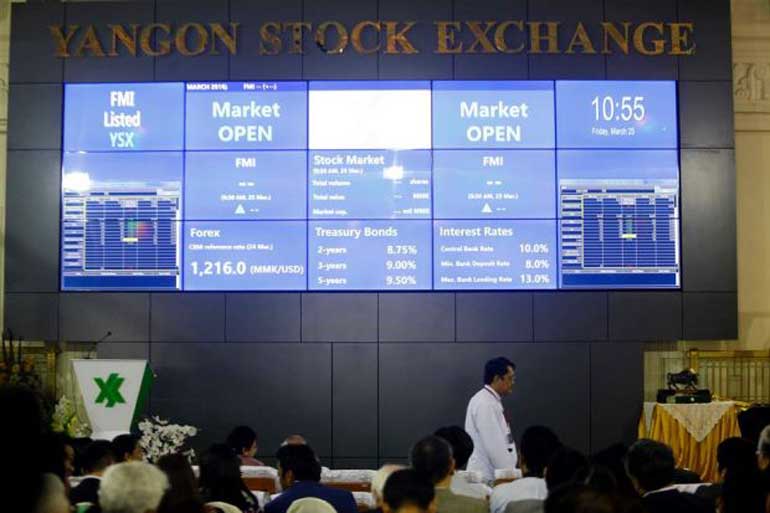Sunday Feb 22, 2026
Sunday Feb 22, 2026
Monday, 28 March 2016 00:00 - - {{hitsCtrl.values.hits}}
 Reuters: Myanmar’s stock exchange began trading on Friday with a single listed company some three months after it opened in the country’s commercial capital Yangon.
Reuters: Myanmar’s stock exchange began trading on Friday with a single listed company some three months after it opened in the country’s commercial capital Yangon.
The Southeast Asian nation’s economy was devastated by nearly 50 years of economic mismanagement under the military government, which ended direct rule of the country in 2011.
The outgoing semi-civilian government that replaced the junta ushered in numerous economic reforms. One of them was to launch the Yangon Stock Exchange (YSX) in December.
“For 50 years there has not been a stock exchange, today is a historic day,” said local tycoon Serge Pun, just before he rang the bell on trading at 11 a.m. (0430 GMT) inside a renovated colonial building that once housed the country’s central bank.
His firm First Myanmar Investment (FMI), one of Myanmar’s largest companies, made the inaugural listing.
The exchange was a ‘farewell gesture’ from President Thein Sein, said Deputy Finance Minister Maung Maung Thein. The outgoing government had emphasised the stock market as a way to catch up to more developed countries.
The president will hand over to the government of Aung San Suu Kyi’s National League for Democracy (NLD) in a ceremony on 30 March, after the NLD won a landslide electoral victory in November.
The FMI listing involved no initial public offering, nor did it raise fresh capital. FMI has transferred shares to list on the YSX that it had already sold to the public through direct subscription.
FMI shares rose to 31,000 kyat ($ 25.70) at the open on Friday, the upper limit for trading for the day after they were listed at 26,000 kyat.
A total volume of 112,845 shares changed hands, for a trading value of 3.498 billion kyat ($ 2.90 million). FMI’s market cap was 727,880 million kyat ($ 603.55 million).
FMI’s sister company, Yoma Strategic Holdings Ltd., is listed in Singapore.
Maung Maung Thein has said previously that Thilawa SEZ Holdings, which controls a new industrial zone jointly run by the government and a Japanese consortium, would be the next company to join the exchange, but it is unclear as to when this will happen.
Myanma Economic Bank owns 51% of the exchange, presenting another potential problem if foreign investors should be allowed to invest in the future. For now, only Myanmar citizens can trade.
The bank is among several lenders on the US Department of Treasury’s list of sanctioned entities due to its ties to the former junta.
Japan’s Daiwa Securities Group Inc and Japan Exchange Group Inc, which operate the Tokyo Stock Exchange, own the rest of the YSX.